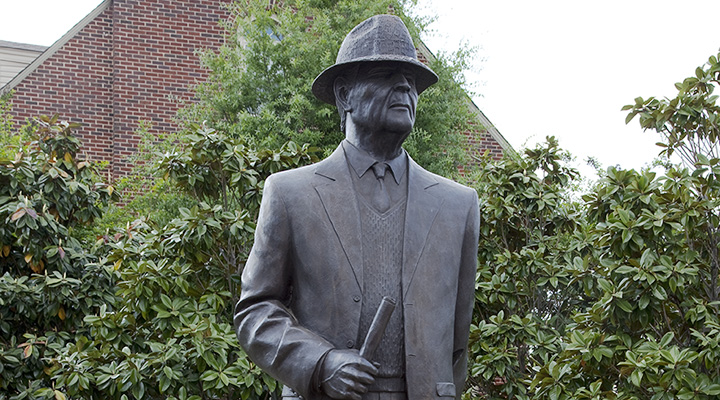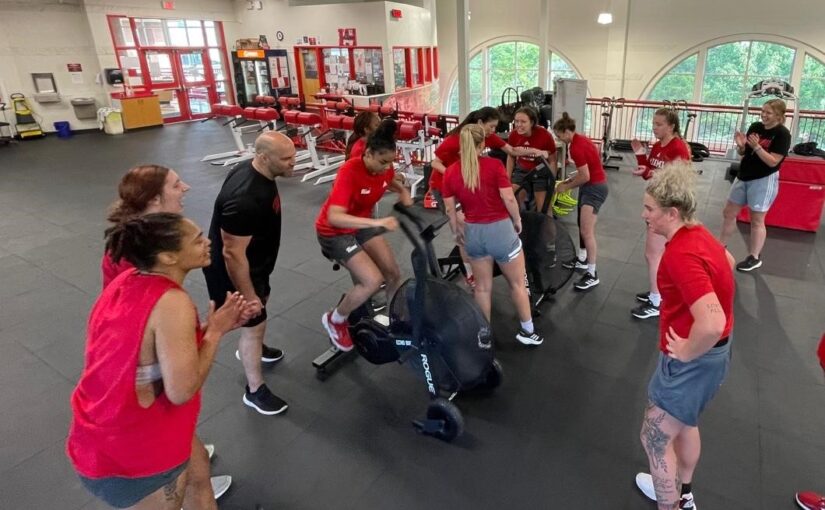Coach & A.D. throwback: Paul ‘Bear’ Bryant talks about philosophy
 Coach & Athletic Director is in its 87th year of production. To celebrate another year educating thousands of coaches and athletic administrators across the world, we thought we’d take a look back and share some material from our archives.
Coach & Athletic Director is in its 87th year of production. To celebrate another year educating thousands of coaches and athletic administrators across the world, we thought we’d take a look back and share some material from our archives.
One of our football clinics in the early 1970s featured speakers like John Madden, Lou Holtz, Barry Switzer and the legendary Paul ‘Bear’ Bryant. Bryant, a College Football Hall of Famer who won six national championships as the head coach at Alabama, spoke about coaching philosophy and why he switched to the wishbone offense.
Here are Bryant’s notes from the clinic:
I’d like to discuss with you some of the things that I have learned through my years of coaching. I feel that what I will talk to you about is essential to a winning program.I think that it is important to be yourself. If you try to imitate someone else, the kids will think you phony. Get some ideas from other folks but coach your own way. Some of my former players who tried to coach like I, have since been fired. There is the view that the coach should treat everyone equally. That is impossible since we are not all equal. You can’t treat everybody the same way. The thing that you can and must do is treat everyone fairly and honestly. Be a man of your word. Give everyone a fair opportunity and be available to discuss their problems with them.
We have all lost games and we learn from it. We try to find out why and make the necessary corrections. A lot of soul searching goes on when we lose. To become a winner you have to learn to do the same soul searching when you win. Find out where your team broke down and why. Check your game plan. Check yourself, ask yourself, did I contribute anything to victory? Did I have poise on the side line? Did I make the proper substitutions?
There is a fine line that separates the winners from the losers. Find this fine line. Recognize a winner when you see one. Leaders are winners. Everyone works hard on the big things. Don’t forget the little things, the fundamentals that win games. Give your team the winning edge. When your players go out, they should have confidence that they are properly prepared.
» RELATED: Throwback: Dr. Jack Ramsay’s 12 ‘absolutes’ in coaching
Respect your staff and players. Give them credit when you win. Don’t be a coach who says “I,” say “We.” The players win, not the Xs and Os. Give your staff and players recognition when they win. When you lose, be man enough to say I blew it. A head coach is just as strong as his staff and players.
Football is simple. It is movement and contact. Preparation is the key. You have to develop within your staff, dedication and pride. It doesn’t matter how you prepare. It is the players who must have the desire to want to prepare. It is important to have that type of football player. He cannot be like any other student. He is a football player and has to make sacrifices. Select the guy who takes pride in being different.
 In football, two or three big plays make the difference. Our 1974 bowl game against Notre Dame shows this to be a fact. They made the big play that made the difference. You don’t know when it is coming. You have to have eleven people who are trying to win on every play. They have to be the type of players who want to make something happen.
In football, two or three big plays make the difference. Our 1974 bowl game against Notre Dame shows this to be a fact. They made the big play that made the difference. You don’t know when it is coming. You have to have eleven people who are trying to win on every play. They have to be the type of players who want to make something happen.
The longest play is the punt. It lasts about seven seconds. The shortest play is a quick pass. It lasts about 1.3 seconds. The average play is about five seconds. The ball is in play about 71 times. In actual game time, that’s about 350 seconds. Anyone should be able to give 101% for that length of time. Class will tell if you make it tell. It shows itself before the half and particularly in the last four or five minutes of the game.
I’ve beaten my team more than the other team has. Something I did beat them. Don’t beat them by:
- Overcoaching
- Penalties
- Broken assignments
When I was at Kentucky the only time we beat Tennessee, we had just three running plays and two passes. Don’t give up on a boy with ability. Find some way to get him back.
Players need discipline. Let me ask you this. Have you taught your children to work? To sacrifice? Have you taught them self-discipline? Hell no. They don’t get it in the home, they don’t get it in the schoolhouse, they don’t get it in the church. The football field is the only place left. Never discipline a second or third stringer. Get after the first stringer; the star who is goofing off. The players will then become believers. When your star makes a mistake don’t go after him too often. You may hurt him not help him.
Be a listener. Don’t talk too much too soon. Don’t always be trying to get someones attention. Listen!! When you say something let it mean something. Let there be a cooling off period after the game. You don’t want to say something you may regret. When you lose don’t hide behind anyone or anything. Don’t make excuses. Don’t take it out on the players. Don’t coach with your hands in your pockets. Plan before you go out to practice. Check yourself out; evaluate yourself. If you have a poor practice, try to find out why. Maybe you caused it. Don’t penalize your team for your mistakes.
Timing is everything in life. There is a time and a place for everything: the time to ask for a job, the time to ask for a raise, the time to change jobs. Don’t bring your team to an emotional peak too early in the week. They may be drained before the game.
Winning program
1. Set on something. Choose something that is going to be your life’s endeavor. In our program we ask our staff and players to set their goals and objectives. They are required to write them down. We refer to them periodically.
2. Plan. Nothing is going to happen by accident. Believe in your plan. Don’t copy from someone else.
3. Tie to people who believe in your plan. Surround yourself with people who are winners. I don’t want any person around me to whom winning doesn’t mean everything. This includes the ticket takers to the guy who mows the grass. Some people are winners but don’t know it. Get them thinking as winners. It becomes contagious.
4. Surround yourself with leaders.
5. In our planning we have to get them “up” spiritually, physically and mentally. Have them understand the meaning of work, discipline, sacrifice, teamwork, cooperation, and no personal glorification. Teach pride in oneself not because I want him to be a winner but because he wants to be a Winner.





